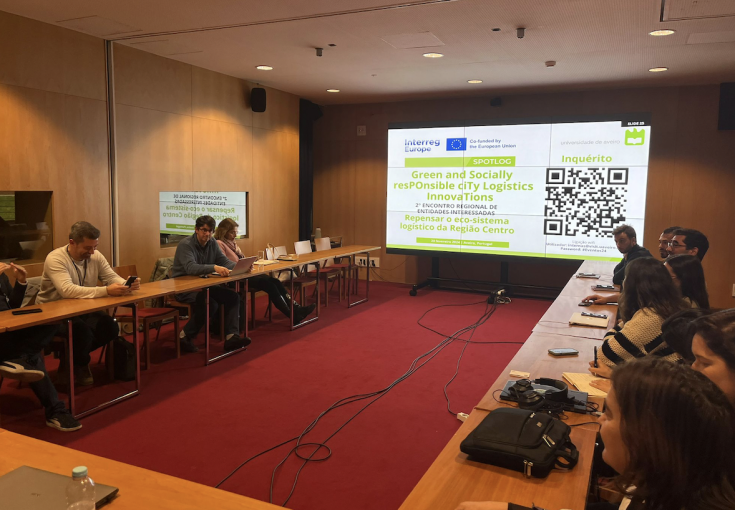2nd stakeholder meeting for Centro Region in Aveiro!
The 2nd SPOTLOG Regional Stakeholder Group Meeting in Centro Region, organised by the University of Aveiro in collaboration with Municipality of Fundão, was held on 23 February 2024 at the University of Aveiro, where innovative strategies and solutions aimed at improving the sustainability and efficiency of the logistics network in the Centro Region of Portugal were discussed. More than 20 stakeholders participated in the meeting, including representatives from the Managing Authority, Municipalities, the Institute of Mobility and Transport, private logistics operators, such as DPD Portugal, Low Low and Xicos, and researchers.
The event began with a presentation by Eloísa Macedo (UA) explaining the vision and objectives of the SPOTLOG project. Afterward, representatives from CCDR-Centro shared their perspectives on logistics upgrade, underlining the fundamental role of Intermunicipal Communities in the current regulation framework in assessing the relevance of logistics projects in the region. It was mentioned a clear priority of the OP Centro 2021-2027 in measures that are truly focused on the transition of logistics operations to more green and sustainable solutions, and highlighted the available amount of financial support dedicated to the priority.
Michaela Gil highlighted the different challenges experienced in rural and low-density areas, explaining the different initiatives the Municipality of Fundão has been putting into practice. She also mentioned that some practices were found to be not suitable for the region due to the low user acceptance/usage, and that was relevant to learning what exactly the region needs. Representatives from the groundbreaking company Xicos emphasised the transformative impact of digitalisation and emerging B2C platforms on local commerce, which can improve the local business and at the same time, the delivery eco-system in rural areas more easily.
Logistics operators are directly involved in the daily challenges and opportunities of their industry within the region. Industry leaders, including DPD Portugal and LowLow, are at the forefront of adopting new technologies for more sustainable logistics. They shared their experiences and insights on transitioning towards sustainable logistics practices and innovative solutions for last-mile deliveries. Both operators are committed to making the logistics operations greener, betting on electric and cargo bike-based vehicles. DPD Portugal also highlighted the potential of improving a PUDO network to minimise travel and reduce the adverse effects of traveling. Discussions focused on the different challenges and needs between logistics in urban centers and rural areas, emphasizing the exponential increase in distribution costs and associated pollution in the latter case. These key logistics sector players are required to understand the current regional regulations and can pinpoint areas where these create an unnecessary burden or inefficiency in terms of the operational tasks. Following an inspiring debate among the participants, stakeholders concluded that the implementation of innovative services, such as smart lock systems, pick-up points and collaborative delivery systems, is essential to guarantee a good and sustainable quality of service in low-density areas. Moreover, they all agree that all regions have been experiencing higher demand for home deliveries and it is very important to invert the trend, by assigning the deliveries in specific out-of-home spots, strategically located within areas that already generate high levels of people movements. In addition, the benefits of vehicle electrification in urban areas were emphasised, as well as the need for cities and public authorities to invest in public micro-consolidation infrastructures.
The discussions of the session finished with an out-of-the-box innovative solution for last-mile deliveries through drones. An insightful presentation by Joaquim Macedo (UA) shared the perspective of potential users. A key takeaway was the public's limited awareness of the potential of this technology and some stakeholders' skepticism about its widespread adoption. However, potential applications for health-related deliveries were acknowledged, with DPD Portugal explaining that there have been some tests to evaluate the possibility of drones used to deliver parcels to remote Alpine villages.
Following one of the activities of the SPOTLOG Project, the stakeholders were invited to fill in a survey to understand their perspectives on the challenges and opportunities for shaping the logistics landscape towards a more sustainable sector.
The logistics sector involves various players, each with unique experiences and needs. Sharing diverse perspectives from different types of operators, such as small local players, large international companies, and specialized carriers, ensures a better understanding of the regional needs and can surely contribute to a policy improvement.
